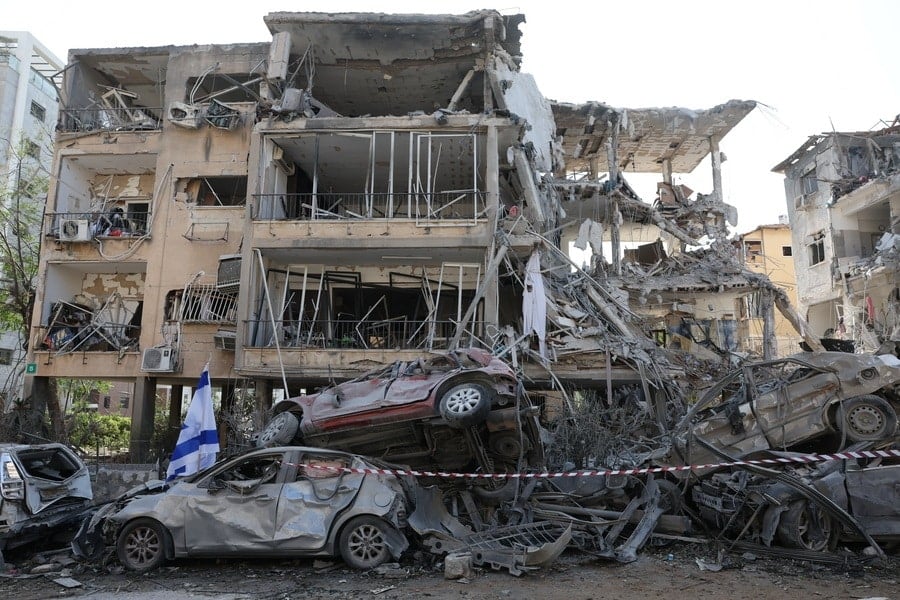

The Greek Government Council for Council for Foreign Affairs and Defence (KYSEA) met on Friday afternoon under Prime Minister Kyriakos Mitsotakis for an assessment of the latest developments in the Middle East, following Israel’s deadly airstrike on Iran.
The Greek Premier cut short his official visit to Sweden and rushed to Greece to head the Council meeting for national security in light of the new tensions in the region.
Concerns have been expressed on the safety of Greek citizens in affected countries, and the impact on maritime safety and tourism.
“Greece closely monitors the alarming developments in the broader Middle East and recognizes that any further escalation could pose a significant threat to regional and global stability,” the Ministry of Foreign Affairs stated in a post on social media platform X earlier on Friday.
“We urge all parties involved to exercise maximum restraint, avoid military escalation, and utilize all available diplomatic and dialogue channels. The international community must take immediate action to prevent a regional conflagration,” the post concluded.
Israel launched an airstrike on Iran with 200 fighter jets, killing 78 and injuring 329, including 6 nuclear scientists and top military commanders After the attack,PM Modi and Israeli PM Netanyahu spoke about maintaining peace in the Middle East#IsraeliranWar pic.twitter.com/doYCR2cdyb
— Akanksha Trivedi (@Akanksha5876) June 13, 2025
Foreign Affairs Minister George Gerapetritis was briefed on the situation and on the assistance provided to Greek citizens in Israel and Iran during Friday’s meeting, while the Council reaffirmed that Greece’s consistent position is for solutions to be sought through diplomacy.
Greece will continue to work in this direction with partners and allies for the benefit of stability and security in the wider region, the government spokesperson said in a statement.
Prime Minister Mitsotakis also discussed regional security in a call with Cyprus President Christodoulides.
The latest developments in the region, security parameters, and potential implications for regional stability were the focus of a telephone conversation on Friday between the two leaders.
Iran has said in a stern tone that we did not initiate the attack.
This simply means that Middle Asia is going to be in crisis. #IsraeliranWar #Iran #Tehran #Israel #airstrike pic.twitter.com/8rN23xZLzz
— Neeraj Ranjan (@NeerajRanjan84) June 13, 2025
The Greek Ministry of Maritime Affairs has urgently requested from the Greek Shipowners Association the details of all the Greek-owned ships which are currently sailing, or are expected to sail, near the Strait of Hormuz between the Persian Gulf and the Gulf of Oman, one of the world’s most strategically important sea passage.
The request was made “due to developments in the Middle East and the escalation of military actions in the wider region.”
The level of alertedness is constantly rising and the situation is very serious, since “there is a new conflagration at Gaza and rising tension across the Middle East, even between India and Pakistan,” according to the Greek Minister of Maritime Affairs, Vasilis Kikilias.
Speaking to the Greek public broadcaster, ERT, on Saturday, the minister warned of far-reaching geopolitical consequences.
Guidelines have been issued by the Operations department of the Greek Coast Guard to Greek-owned ships and ships under Greek flag sailing near Hormuz, and data are revised every six to twelve hours. Ships of Greek interests make up for twenty percent of the global fleet, which statistically means a large number of them is also at the affected area.
The crisis between Iran and Israel does not only impact shipping, though. It also directly affects production, the primary economy, industry, tourism, and the daily lives of citizens, even in terms of gasoline prices, Kikilias pointed out.
Iran may have yet one very serious card up its sleeve.
If Iran decides to blockade the Hormuz Strait.
Things get serious very fast. pic.twitter.com/T1Too0cd8Z
— Chay Bowes (@BowesChay) June 13, 2025
Action is also taken to prevent possible safety risks within Greece, as discussed at the Ministry of Citizen Protection.
Like Kikilias admitted on ERT, all European countries are thinking about getting organised against possible targets on the European continent, although he believes that Greece is not yet at a point of considering the shielding of possible touristic targets.
The Ministry of Foreign Affairs activated the Crisis Management Unit immediately after Israel’s airstrike on Iran, in order to ensure the safety of Greek citizens in Israel, Iran, and the wider region.
In Israel, there are approximately 4,500 Greeks or individuals of Greek origin, along with their family members. Contact phone numbers have been provided to ensure direct communication with the Greek embassy in Tel Aviv and the consulate in Jerusalem. In Tehran, the number of Greeks is estimated to be between 50 and 70.
“A tremendous effort is underway. If necessary, an evacuation plan will be implemented. The evacuation plan is already in place and will be activated if required,” Foreign Affairs Minister George Gerapetritis told Open TV on Friday.
“The area is a potential minefield,” Gerapetritis added. “For the past 20 months, we have been experiencing the most difficult and precarious situation since World War II. There are multiple flashpoints globally, and such flashpoints have historically created the conditions for major conflicts.”
Additionally to the measures taken for Greeks in Israel and Iran, in light of the closure of Jordanian airspace, the ministry advises Greek citizens currently in Jordan to contact their airline, consult official sources for updates, and follow the instructions of local authorities and contact the Embassy of Greece in Amman if needed.
A recommendation issued in October 2023, advising against travel to Lebanon except when absolutely necessary, remains in effect.
